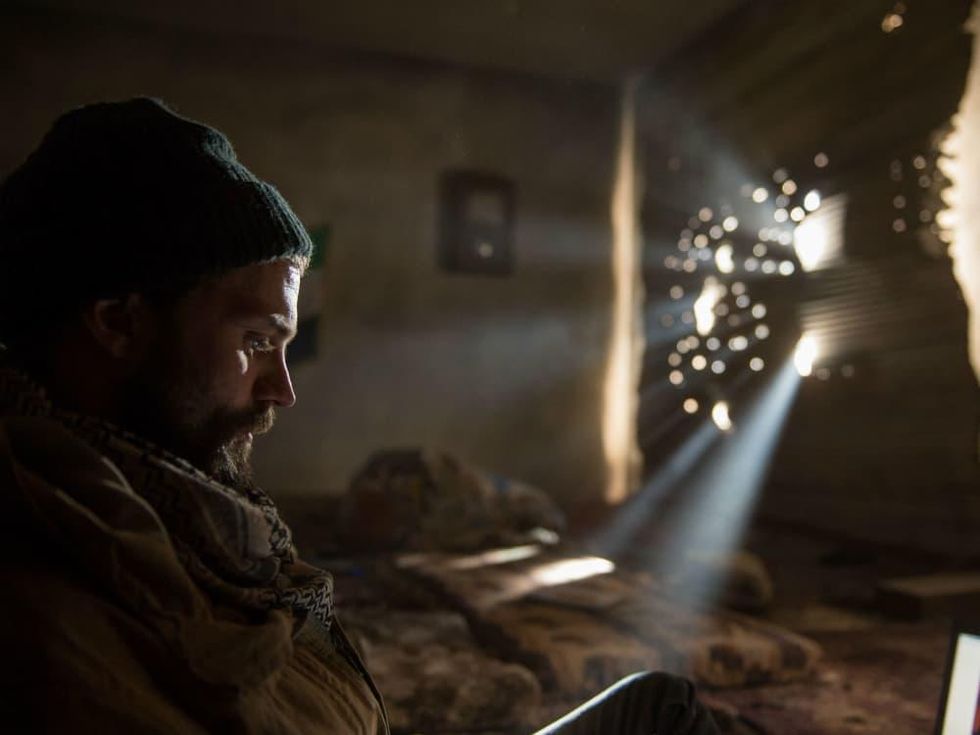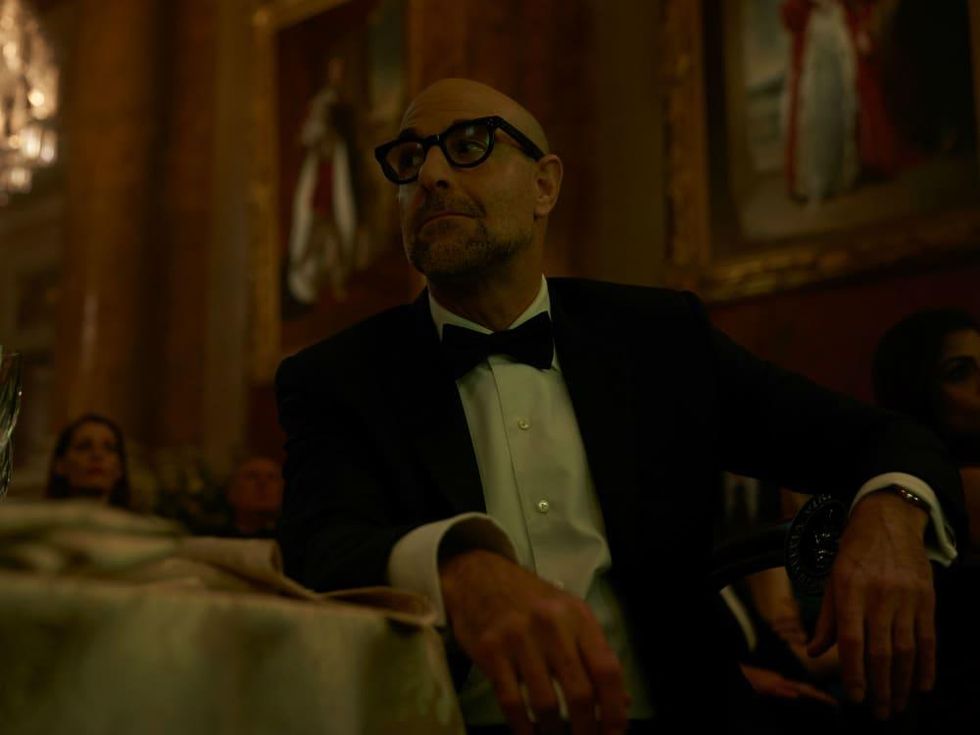A couple from one of Dallas-Fort Worth's most famous Christmas-light neighborhoods is stepping into the national spotlight: Melissa and David Loder, who present a spectacular "Elf Town" display in Plano's Deerfield subdivision, will compete on ABC's holiday competition show The Great Christmas Light Fight on Thursday, December 18.
The Loders will be one of three U.S. families battling for a trophy, $50,000, and major holiday-light bragging rights; co-host Taniya Nayak is the judge.
The episode will air at 9 pm (CDT) on ABC stations, but unfortunately for local viewers, WFAA will pre-empt it for the Dallas Mavericks basketball game. Light Fight will stream on WFAA+ channel 8.2 at 9 pm and later on WFAA / Channel 8 at 3:11 am. It will be available to stream on Hulu beginning Friday, December 19.
"[Filming the show] was surreal at times, but we also knew we had created something special with Elf Town," says Melissa Loder.
 The Elf Town Depot, with mayor Elfus standing guard.Photo courtesy of David and Melissa Loder
The Elf Town Depot, with mayor Elfus standing guard.Photo courtesy of David and Melissa Loder
Exploring Elf Town
The Loders moved to Deerfield in 2008. Homes in the subdivision in northwest Plano annually host a dazzling winter wonderland called "Deerfield Holiday Lights," which visitors can drive, walk, or ride a carriage through.
Melissa and Dave have been creating and evolving Elf Town since 2011. They use it as a platform to raise money for the Susan G Komen Foundation, an organization especially dear to Melissa, a breast cancer survivor.
They call Elf Town "a place where holiday elves live, work, and play."
"Like any town, we have a Main Street with a school, shopping, a bakery and a tavern all leading to a mega tree in the town center," Melissa says. "New this year is the Elf Town Museum that has photos of the evolution of Elf Town."
"We also have industry - the toys travel via train, and there is a train depot for the elves to get their tickets and wait for the train," she adds. "We also have an entertainment area with a Ferris wheel and a disco for the elves."
Standing guard over it all is The Mayor of Elf Town, a 20-foot elf named Elfus. And for the show, they created an all-new special feature: Santa's Spa in the backyard - "an area where no elves are allowed," she says.
David and Melissa, who call themselves the "head elves" of Elf Town, work all year on their DIY display. "Woodworking, welding, painting, design and installation," they say, "are all done on site by our little band of elves," which include their daughter and son-in-law Alex and Joel Loper and their grandsons, Kade (8) and Tristan (5); nieces and nephews Sophie Polma (25), Maxine Polma (23), Beckett Polma (21), and identical twins Marlowe Polma and Julian Polma (19).
"We also have amazing friends who materialize when we are putting up and taking down the display," they say. "Additionally, friends Roger and Rita Reynolds made guest appearances [on the show] as a famous couple from the North Pole."
Getting on the show
The Loders light their display up nightly for the public each holiday season. They were "discovered" by The Great Christmas Light Fight when a casting producer tracked them from a stranger’s TikTok video in spring 2022.
Dallas-Fort Worth is a popular location for the show. The Loders now join the ranks of other Light Fight-famous homes, including the Burkman Holiday Home of Frisco (2021); the Ward family of Sky Elements Drone Shows in Keller (2023); the Hugheses' "Stay in the Light" in Rockwall (2024); the Joules-Cornettis' "Gift of Light" in McKinney (2024); and the Mach Christmas Display in Ennis (2024).
"Of course we had seen the show from its first season, but since our focus is less about just lights and more about creating a magical world, we didn’t think we were a fit," Melissa says.
 The Loders have been presenting Elf Town since 2011.Photo courtesy of David and Melissa Loder
The Loders have been presenting Elf Town since 2011.Photo courtesy of David and Melissa Loder
They shot an audition video in 2023 and soon found out they made the cut. The show filmed at their house over three days in November 2024.
"The process was three very long days of filming with a very sharp learning curve," Melissa says. "Our on-site producer was an amazing asset in the process. Her tips and tricks helped us all embrace the process, relax in front of the cameras, and hopefully come off well in the show; it was a whirlwind but so much fun.
"I think the best part of filming was getting to learn so much about another industry that was so foreign to us. I am a clinical psychologist in private practice, and David is in sales with Porsche Plano, so we aren’t 'performers.'"
Fighting on
The Loders can't reveal whether they won the Great Christmas Light Fight, of course. (They'll be watching Thursday at a big party at Legacy Social Room.) But they can say with certainty that their display will continue to aid in the fight against breast cancer.
"We participate in the 3 Day 60 Mile walk each year and the money donated goes to our 3 Day fundraising accounts," Melissa says. "Collectively, our little family of elves have raised over $180,000 to help fund vital cancer research and contribute to patient care and advocacy."
Elf Town will light up daily from 5:30 pm to midnight through New Year's Eve 2025, with special nights offering hot cocoa, candy canes, or photos with Santa. While it's free to view and experience, visitors are invited to donate via fundraising links on their Facebook page and through Melissa's Susan G. Komen 3 Day fundraising page.
"I think the most important part of our display is that David and I do this together as a hobby and a gift to the community," she says. "We love that we were able to do The Great Christmas Light Fight, but our true motivation for the time, energy, and money that we pour into the display comes from the stories we hear year after year of families who count on us to be part of their tradition."
She says those include visitors finding the display as solace in hard times, along with marriage proposals, baby's first visit with Santa, and more.
"We have even been brought to our knees by a woman who brought her infant daughter and took photos all around the display because she had a terminal cancer diagnosis and wanted her daughter to have 'magical' pictures with her so 'when she was an angel,' her daughter 'will know I believed in magic,'" Melissa says. "All of these stories and so many more are part of the legacy of Elf Town. These are our 'why' to the question we are often asked 'Why would you do this?'"
---
The Great Christmas Light Fight will air at 9 pm December 18 on ABC and will stream December 19 on Hulu. Find Elf Town at 4641 Penbrook Ct., in the Deerfield subdivision of Plano. It's open nightly, 5:30 pm-midnight, through December 31. Follow the Elf Town Facebook page for updates. Visitors are encouraged to park on a less busy street, or at the elementary school off Quincy, and walk through the neighborhood. For the best Fort Worth-area Christmas lights, go here and here.










 The Elf Town Depot, with mayor Elfus standing guard.Photo courtesy of David and Melissa Loder
The Elf Town Depot, with mayor Elfus standing guard.Photo courtesy of David and Melissa Loder The Loders have been presenting Elf Town since 2011.Photo courtesy of David and Melissa Loder
The Loders have been presenting Elf Town since 2011.Photo courtesy of David and Melissa Loder